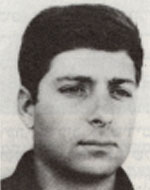Yaakov (Kobi), son of Ruchama and Yosef, was born on January 2, 1945 in Kibbutz Naan. He completed elementary school and high school at his kibbutz school. Kobi, as his family and friends affectionately called him, was born at the end of World War II, a second son to his parents. When he was six, he traveled with his parents to Paris, where they were sent on behalf of the United Kibbutz Movement. They spent a year and a half there, and this period left strong impressions in his memory. Kobi was a sensitive child with a rich imagination. His musical and artistic inclinations were evident in the elementary school years. He was particularly interested in history studies and scientific thought, was active and influential in his class, was loved by his group, the Arava group, and participated in organizing the parties and trips of the group. Together with his peers, he was a member of the Hanoar Haoved Vehalomed youth movement and was active in the Gadna Air Force, and he heard stories about the Holocaust from his parents, reinforcing the love of the country and the belief in the existence of the State of Israel in our land. When he completed his studies, Koby was accepted as a member of his kibbutz, Na’an, and was employed in the orchard, where he was drafted into the IDF in early November 1963 and assigned to the armored corps. After basic training and after completing his tank course and tank commander course, he was placed as tank commander in the 7th Brigade’s armored unit. Kobi fell in love with the tanks and found a great deal of satisfaction in his job. He excelled in his personal ability and technical ability and was highly regarded for his personal and professional achievements. Many friends also purchased during his military service. In 1966 he was discharged from regular service and was called from time to time for active reserve duty. After returning to his kibbutz, he soon left for a “third year of service,” which was used by the movement for young people who had completed their military service. He took a course for counselors at “Efal” and later taught at the branches of the Hanoar Haoved Vehalomed movement in Ramat Aviv and Bnei Brak. In the Six-Day War, this work was stopped and he was drafted and fought on the Sinai front, in Major General Yaffe’s division, along the central axis and in the breach of the Gidi crossing to the Canal. For him, the war was a deep and difficult experience that influenced his worldview and his future path. A little of the change that took place in it was expressed in the “Dor El Dor” conversation, which was published in the “Dialogue of Fighters” collection. Kobi joined the first group of farmers who came to hold on to the Golan Heights, and you laid the foundation for the kibbutz, which began with Bialika and Kuneitra, and now – at its permanent settlement – is called Merom HaGolan. Instead, he established a home for his family when he married his girlfriend Eilat Rotem of Kibbutz Sdot Yam. He worked in the garage and in the field and held positions in the secretaries, in the work arrangement and in the company committee. He was involved in economic life and accepted by the members. In 1971 he returned to the army and took a course for armored corps officers, and throughout that period maintained close contact with his first kibbutz, Na’an, where his parents, brother and sister sat. In 1973, about half a year before the Yom Kippur War, his son was born. When the war broke out, the women and children were evacuated from the Golan Heights, and Kobi went to his unit in the south, deeply concerned about their fate. On the 22nd of Tishrei 5740 (October 22, 1973), with the announcement of an official cease-fire, his battalion was ordered to gallop quickly across the Channel, to the south of the Little Bitter Lake, On the evening of the same day, Kobi was killed by a sniper’s bullet and brought to rest in the cemetery in Kibbutz Na’an, leaving behind a wife and son, parents, brother and sister. His kibbutzHe published a memorial booklet commemorating the fallen members of the kibbutz, and Kobi among them.
